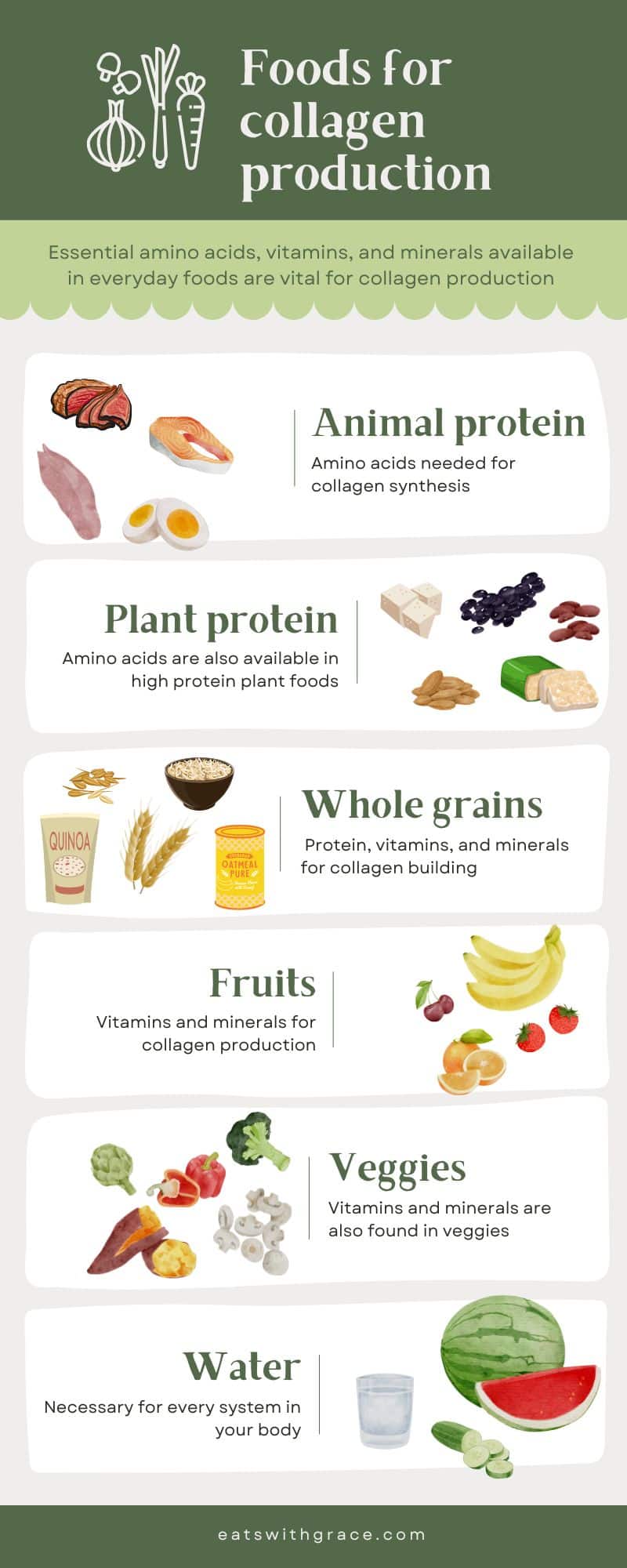Collagen is found in protein foods; however, the buzz around supplemental collagen abounds.
This article covers what collagen is, its role in the body, where to get collagen from foods, supplemental collagen, its safety, and if it makes you poop.
What is collagen?
What does collagen do in the body?
Collagen helps form tendons that connect muscles to bones and ligaments that connect our bones. Collagen comprises our teeth, bones, hair, nails, skin, and gums.
During wound healing, the resilient collagen-rich connective tissue is formed and maintained with the help of vitamin C.
Consuming collagen
Intact collagen eaten (from foods or supplements), known as exogenous collagen, is digested in the stomach. There, it is broken down into its component amino acids. It will then be remade in the body as needed. Whether we eat collagen or other proteins, we can make all the collagen we need.
Eating enough protein is priority number one. Before considering how much collagen you are consuming, ensure you are getting the minimum recommended amount of protein per day, which is 0.8 grams/kg.
Individuals working on increasing their bone mineral density or strength and muscle tone need more protein. Aiming for higher amounts in the range of 1.2 – 1.6 grams/kg of protein per day may be beneficial.
In simple terms, that looks like 44 grams of protein for a 120-pound lady at 0.8 grams/kg, or at 1.6 grams/kg, it would be 87 grams of protein.

Foods for collagen production
Foods for collagen production are everyday foods.
It’s essential to enjoy protein-rich foods at each meal. Our body makes collagen from amino acids, the building blocks of proteins.
Animal protein sources come from meat, poultry, fish, and eggs. Plant protein foods include soy foods such as tofu and tempeh. Other plant sources include beans, nuts, seeds, and whole grains.
All these foods give us the essential amino acids for collagen building.
Consuming various fruits and veggies for the vitamins and minerals (helper nutrients like vitamin C and zinc) is necessary for protein synthesis. For optimal utilization of these nutrients, hydration is critical.
Plus, by eating foods, you not only gain the benefit of making collagen, but you get the other perks from the other nutrients that naturally occur in the foods you eat.
For example, fiber, found in plant foods, can help you poop and help you have a healthier digestive tract. Consuming a variety of foods provide the backbone for collagen formation.
Taking collagen supplements
Collagen powders, drops, and pills are available commercially. Land and marine animal collagen supplements are on the market. Also available is vegan collagen, which is made in a lab.
Vegan collagen can be synthesized in a lab using yeast, specifically Pichia pastoris. The digestive enzyme pepsin is added to make it identical to human collagen. Currently, this is in limited production, but mass production can be possible. Vegan collagen is available in skin care products, and you may see it on your grocery store shelves soon.
Is consuming collagen supplements safe?
Potential harm does exist in taking collagen or any supplement.
We recommend food first as we review collagen in the supplement form. Our education and experiences and reviewing the available peer-reviewed research point to nutrients in foods performing better for the human body instead of supplement form.
Frequently, this is because other nutrients or phytochemicals in the foods work together to produce desired health benefits.
We found one study on rats that revealed undesirable concerns with supplemental collagen intake. Researchers placed 24 rats into 3 groups all fed rat chow. One group was the control group. The other two groups were experimental and fed collagen peptides. One was salmon based, and the other was tilapia.
The authors found that the experimental rats gained more weight throughout the study (16 days) than the control group. They also noticed a change in the gut environment that led to a shift in short-chain-fatty-acid metabolism. Lastly, the investigators speculated that the rats could develop liver dysfunction with long-term intake of collagen peptides.
Sometimes studies are initially conducted on animals because of potential harm to participants in human trials. These studies are important to show us the potential risks of taking supplements.
The FDA regulates supplements for truth in labeling, which means that what is on the label matches what is in the container.
For example, suppose a supplement for omega-3 fatty acids has on the label that it is omega-3 fatty acids, 2000 mg/serving. Then the container must, by law, contain 2000 mg/serving of omega-3 fatty acids. This is just like a can labeled as green beans, which must, by law, have green beans.
Still, supplements are not regulated the same as medications. This means they have not gone through the rigorous testing that is required for drugs.
Supplements have the potential to interfere with medications or your overall health status.
If you choose to take supplements, we recommend selecting ones with the USP seal. The seal verifies the ingredients and amounts stated on the label, and it ensures regulations are followed in preparing supplemental products.
Collagen and bowel movements
Does collagen make you poop?
In a 2-phase mixed methods study, it was found that collagen supplementation helped reduce problematic digestive symptoms. Still, it doesn’t include what they ate or other lifestyle considerations.
Self-reporting data was provided by 35 female participants over the age of 25 who were overweight or obese with a BMI of more than 25 kg/m².
Of the research data, only 1 in 35 subjects said it helped with constipation; 6 said it helped to keep them regular.
In our review of the professional peer-reviewed literature, evidence that collagen makes you poop is lacking. We concluded that collagen doesn’t have this effect.
What collagen does in the colon as we age
Several studies report buildup of collagen on the lining of the colon and especially the right (ascending colon), which increases with age. This can decrease the motility of the colon, which means muscular activity declines in the colon’s lining. Increased risk for constipation results, regardless of gender.
Does collagen help with constipation?
Collagen is essential for optimal human health; however, we would not use supplemental collagen to treat constipation. Always remember that the building blocks for collagen are available from foods.
Lifestyle modifications and various medications are prescribed for treating chronic constipation. Still, we did not find any that included supplementing with collagen. To help with constipation, enjoy a fiber-rich meal pattern, stay well-hydrated, and exercise often as part of a healthy lifestyle.
If these actions do not improve your situation, speak with your physician about a possible pelvic floor dysfunction.
Conclusion
Eating everyday foods contributes to a healthy digestive system and overall optimal health.
Collagen is the most abundant protein in the body and a major player in connective tissue. Supplementing with collagen is not necessary and may potentially cause harm. We would not use collagen to treat constipation.
If you enjoyed this article, others are available on this site. And be sure to join our mailing list. We keep emails to a minimum, usually only one a month.


